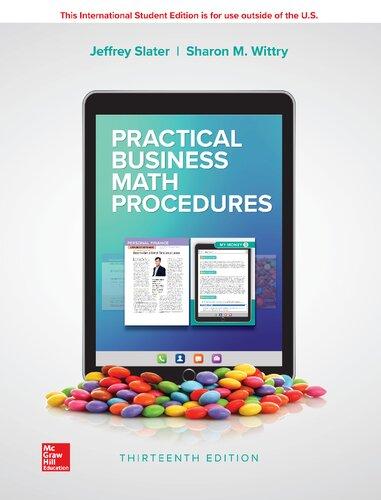Visit to download the full and correct content document: https://textbookfull.com/product/practical-business-math-procedures-with-business-m ath-handbook-jeffrey-slater/

More products digital (pdf, epub, mobi) instant download maybe you interests ...

Practical Business Math Procedures 13th Edition Jeffrey Slater
https://textbookfull.com/product/practical-business-mathprocedures-13th-edition-jeffrey-slater/

Math For Business And Economics: Compendium Of Essential Formulas Franz W. Peren
https://textbookfull.com/product/math-for-business-and-economicscompendium-of-essential-formulas-franz-w-peren/

Business Analytics Jeffrey D. Camm
https://textbookfull.com/product/business-analytics-jeffrey-dcamm/

Business Analytics, 5e Jeffrey D. Camm
https://textbookfull.com/product/business-analytics-5e-jeffrey-dcamm/

Engineering Math Kenneth Kuttler
https://textbookfull.com/product/engineering-math-kennethkuttler/

Essentials of Business Analytics Jeffrey D. Camm
https://textbookfull.com/product/essentials-of-businessanalytics-jeffrey-d-camm/

The Discrete Math Workbook A Companion Manual for Practical Study Sergei Kurgalin
https://textbookfull.com/product/the-discrete-math-workbook-acompanion-manual-for-practical-study-sergei-kurgalin/

Math smart the savvy student s guide to mastering basic math Penguin Random House
https://textbookfull.com/product/math-smart-the-savvy-student-sguide-to-mastering-basic-math-penguin-random-house/

Perfect 800: SAT math Celenti
https://textbookfull.com/product/perfect-800-sat-math-celenti/
Another random document with no related content on Scribd:
I like, and I had made him come to the station because I was afraid of meeting Rahas alone. And I told him to take tickets for him and me, and we went back by the next train to the station where Rahas got out. The porter said two gentlemen had got out and gone across the fields; and I knew who the other one was, and I screamed, and told William my husband had come back. But he said it was a fancy. We walked across the wet fields in the dark, and I was trembling so that I could scarcely stumble along, and William carried a lantern, and said I had better go back, for we were on a wild-goose chase. And when we came down to the wood, my foot slipped, and I fell on to the grass, and as he stooped to pick me up, William saw marks on the ground, as if something had been pulled along over it. He went a little way slowly until I heard him give a cry, and I ran to him, and— and we found you.”
She could not say more, her voice was suffocated, her lips were shaking. But the whitewashed walls of the room in which he was lying, the hayrick he could see through the window, told George that it was to a farmhouse he had been brought; and there they spent two days, until he was well enough to get up and go with Nouna back to her friends in Plymouth. Then began for them both in the pretty southern town a new and sweeter honeymoon, marred only for each by a secret fear for the other. In the first days of their re-union happiness gave their wasted frames a new vitality which made each feel on the high road to health, but which made to each only the more evident the pale face and heavy breathing of the other.
They were sitting together in the sunlight one May afternoon, the window wide open, the breeze coming in straight from the sea, drinking in the joy of each other’s presence as they were never tired of doing, when George passed his hand slowly down his wife’s cheeks, and shivered.
“Are you cold?” she asked anxiously, nestling up to him and putting her little arms round him as if to protect him from the spring air
“No,” he said in a troubled voice, “I’m all right. But I’m afraid this place doesn’t suit you, Nouna; you’re getting so thin and white. You are paler than when I came back.”
Nouna’s face changed; after a moment’s pause she sprang up with her old vivacity, and running to a looking-glass, gazed at her own reflection for some minutes, and then crept back to her husband’s side with a bright light in her eyes. As he looked at her inquiringly, she drew up the sleeve of his coat as far as she could, very gently, and then baring her own arm also, laid it beside his, and glanced up into his face with an odd, tender, yearning expression which, after a moment’s wonderment, opened his own dull eyes. For a few seconds neither spoke again. Then he snatched her into his arms and their eyes held each other’s for some minutes in an ecstasy of relief and gratitude. George had loved his wife better than his career, better than his own happiness. Nouna, since the fall of her first idol—her mother—had turned all her devotion to the husband who had cherished her so tenderly. Both, therefore, dreaded life without the other a thousand times worse than death, and when it dawned upon them that they were not to be parted again, there was no further sorrow possible for them in this world.
“George,” said Nouna at last, in a broken whisper, “if you had never met me you would have been much happier, for you would have married that good Ella and have got on in the world and become a great man.”
“Yes,” said he at once.
“Well, aren’t you sorry?”
“No.”
“Why?”
It was not easy to explain. The sailor, sinking with his ship at twenty-five, does not in his last moments wish that he had been a grocer, though if he had he might have gone on contentedly selling tea and candles for half a century. George, struck down by misfortune in the prime of his youth, had tasted some of life’s supremest joys, and the rolling years could give him no delight such as he had felt in running the whole gamut of an absorbing passion. He hesitated before he answered her
“If I had not married you,” he said at last, “you would never have been poor, you would have had as many lovely dresses and diamonds as you wanted, and nobody would ever have teased you
to tell the truth, or to do anything you didn’t want to do. And yet you are not sorry you married me. What’s the reason?”
She curled herself about him. “I don’t know,” she said shyly. “You’ve made me feel things I didn’t—feel—before.”
“Well, Nouna, and you’ve done the same to me. Are you satisfied?”
“Yes,” she said.
“Then so am I.”
And in this state of placid but languid contentment these two shipwrecked creatures drifted on day by day, tired out by the buffets of fortune, and making no effort to escape from the black archer who seemed to have marked them down. The young come to this stage more easily than the middle-aged; when their strong passions and eager desires burn low, quenched suddenly by ill-health or desperate misfortune, all the busy wheels of the world seem to stand still with them, and they cry, when they feel that the pulse of life beats weakly: “This is the end!” While older sufferers, who have shaken Time by the hand, and know his ways, and have learnt to bear his penalties patiently, see only the daily work interrupted against their will, waiting to be taken up again when the storm is over.
There came to Plymouth, when Lauriston and his wife had been a week there together, a friend who saw something of this, and set her wits to work, after her custom, to put right what she saw was wrong. Ella Millard had brought her whole family to the town on the plea that a fortnight of the Devonshire air would improve her sisters’ complexions, and arm them for the triumphs of the coming season. Having gained over her mother, from whom she inherited her own strong will, the rest yielded like lambs, and within a week of her resolution to come they were all installed in a house at the upper end of Lockyer Street, near the Hoe. By Sir Henry and his two eldest daughters, who all enjoyed a serene animal health, and to whose lymphatic temperament trials of the nervous system were meaningless words, the wan faces and languid movements of the Lauristons were looked upon as altogether fatal signs. But the more discriminating Ella would not give up hope so easily. It seemed to her contrary to common sense, and to the lofty qualities she attributed to him that the man who had been her ideal should allow himself to be
snuffed out of life so easily Afraid to depend entirely upon her own judgment in such an important matter, she refrained from setting her scathing little tongue to jibe at him for the inertness of his mind until she had found some person of authority to pronounce upon the health of his body. But George had never before in his life been in need of a doctor, and scouted the idea of seeing one now; while Nouna, on whose behalf Ella then pleaded, shrank sensitively from the ordeal of meeting a stranger, and only consented at last to see the physician whom George had called in to dress her arm on the memorable evening of his first visit to Mary Street. The very next day Dr. Bannerman arrived, and had an interview with both his patients. The entrance of the tall, slightly stooping figure, the sight of his dark, penetrating face, lean, lined, and impressive as that of a magician, raised a flush of excitement to Nouna’s face, and brought back to her husband’s mind a vivid recollection of the prophecy uttered by the doctor on that May evening. If the sharp eyed man of science knew all the circumstances that had chequered Lauriston’s life since he disregarded that warning, he would indeed think that his sinister prophecy had been amply fulfilled.
The interview was a short one. The doctor affected to have no recollection of either of his patients until George followed him out of the room, and stood face to face with him on the landing.
“You remember me, doctor, I suppose,” he said in a rather shamefaced way.
“Perfectly.”
“The first time you met me you were kind enough to read me a sermon. You might read me one to more purpose now.”
“More purpose! No. You can read your own sermon now, and I come to my proper function, that of curing the results of the acts my warning could not save you from.”
“If you knew the whole story, doctor, you would hardly blame me.”
“I don’t blame you. How can I blame conduct which brings me a patient? If all men were wise, we poor medicine men might go sweep crossings.”
“But, doctor, if I had been a wiser man I should have been a worse one.”
“Not necessarily And it shows no more virtue than wisdom to throw up the sponge when you are beaten by Fortune at the first round.”
George reddened. “First and last round too, isn’t it, doctor? Come, tell me honestly how long you give me to live.”
Dr. Bannerman looked at him steadily.
“If you remain mooning about here, hovering along like a moth in the sunshine, brooding over things which are past and beyond remedy, I give you a year. If you buckle to, make yourself new interests in life, start on a new career, and get new air into your lungs and new thoughts into your brain, I give you any time from ten years to five-and-twenty.”
George instinctively drew himself up into a more martial attitude.
“And my wife?” he asked with fresh interest and eagerness.
“I give her as long as she has a strong heart and a brave arm to take care of her.”
The young man turned his eyes away with a new light burning in them. At last he said with a tremor in his voice:
“You would not deceive us about this, of course, just to keep us lingering on a little longer?”
“Not a bit of it. You are both suffering from severe shock to the nervous system, and because each of you thought you were going to lose the other, neither has had the energy or the desire to pull round. You besides have a weak lung, and I tell you frankly you would not make her majesty such a smart young officer again. But a man of your intelligence must have other resources.”
George saw by the foregoing speech that very little of his history during the past year was unknown to the doctor. On the whole, this knowledge made him feel easier.
“I think I could write,” said he reflectively. “I have already given myself some sort of training for it, and if only all my ideas did not seem to be locked up somewhere out of my reach, I think I could express them at least intelligibly.”
“Good,” said Dr. Bannerman. “Then all we have to do is to find the key. I think I know a friend of yours whom we can consult about that. You shall hear the result of our conference very shortly. In the meanwhile, keep up your spirits and keep out of draughts, and
English literature may yet thank your wife for taking you out of the army.”
George shook his hand warmly, and the doctor left the house. Half way down Lockyer Street he met Ella Millard, who was burning with impatience to know the result of the interview. As he came up she hastily dismissed a fair-haired young fellow of three or four and twenty, who trotted meekly off at once towards the Hoe. She was too deeply interested in what the doctor had to tell to utter more than the word “Well!” in a tremulous voice. She thought, however, by the expression of his face that his news could not be very bad.
“Well!” he repeated after her.
“Is it well?” said she impatiently.
The doctor smiled. “I think so.”
Her face softened. “I thought it could not be the worst; it would have been too dreadful—and too foolish,” she added sharply.
“That is just what I told him. Oh! I was very hard with him; I thought he wanted it. He has had an awful time of it lately, and the poor boy hardly knows even yet whether he is on his head or his heels. But it is quite time now that he made an effort to pull himself together. I gave him a good talking to, I can tell you.”
Her look seemed to implore mercy, but she said nothing. He continued: “They ought to go away. He thinks he could write, and I should encourage him to try.”
“And—his wife?” she asked, with a scarcely perceptible diminution of interest.
“There is nothing organically wrong with her at all. She will be herself again before him, and then help his recovery.”
“Help him! Do you think so?” asked Ella doubtfully. “Yes.”
“I thought you told me, that when you first saw her she produced on you a very different impression.”
“So she did. But then—she was a very different woman.”
Ella’s mouth twitched rather scornfully She thought that the weird prettiness of Nouna’s little wasted face had bewitched even this middle-aged doctor.
“She is scarcely even yet an ideal companion for a man of intellect,” she said with a slight touch of her worst, most priggish
manner
“H’m, I don’t know,” said the doctor. “Your man of intellect is generally a man of something else besides; and the housekeeperwife and the blue-stocking wife both frequently leave as much to be desired as—well, say, the flower-wife, if once the flower learns to turn to the sun, as, I think, little Mrs. Lauriston has done.”
“She is fond of him,” agreed Ella rather grudgingly.
“And what more does he ask of her?”
“Nothing more now; but will it be always so?”
“Who can tell? But love on both sides is a good matrimonial foundation. Have they any money?”
“Enough to live upon as quietly as they are doing now.”
“Ah! but they want something more than that. He ought to move about, to travel, and she ought to be tempted back to interest in life with some of the pretty things she is so fond of. Haven’t they any relations who could manage that?”
Ella’s face brightened with a little smile as she nodded assent. “I think the relations can be found,” she said.
Apparently the doctor thought he had put the suggestion into good hands, for he looked at her very good-humouredly as he held out his hand and bade her good-bye.
“The gentleman who was dismissed for me will be wishing me all the nauseous draughts I ever prescribed,” said he drily.
Ella grew superbly disdainful.
“Oh no,” she cried with haughty emphasis. “He is only a silly young fellow who was a fellow-officer of Mr. Lauriston’s, and who is so fond of him that he has come down here on purpose to see him, although he puts off doing so from day to day for fear of waking in him recollections which might distress him.”
The doctor was more than satisfied with this elaborate explanation.
“I dare say he manages to fill up his time agreeably enough—in this pleasant neighbourhood,” said he gravely
And he raised his hat and left her before she had time to utter another protest.
Now, quite unintentionally, Dr. Bannerman had done a very ill turn to a most harmless and kindly fellow-mortal. Clarence Massey, the
humble companion whom he displaced at Ella’s side, having been attracted to Ella by the devotion with which she had worked for his friend George Lauriston, had raised up an altar to her in his most affectionate and warm heart, on which, figuratively speaking, he burned incense all day long. Whenever and wherever she would let him, he followed like a dog, bearing her snappish fits with beautiful meekness, accepting any remarks she liked to throw to him, as precious pearls to be treasured in his memory; gentle, loyal, and devoted always. Ella, who had begun by laughing at him, had been thawed by his distracted anxiety and misery over George Lauriston’s misfortunes, until from tolerating she had begun to like him. And now, just as she was getting so amiable to him that he had begun to entertain hopes which he had the sense and modesty to think extravagant, this light suggestion on the part of a stranger chilled her into anger at the thought that any one should think her capable of a serious thought for so unintellectual a person as Clarence Massey.
She had promised, on Doctor Bannerman’s approach, to rejoin Clarence on the Hoe; but it was with the step of an offended empress that the plain little girl met this well-provided young fellow, on whom a dozen mammas of marriageable daughters now fixed longing eyes.
“Well, what does he say?” asked Clarence, afraid from the expression of her face that the report was bad.
She told him briefly and coldly the substance of the doctor’s opinion, but without any hint of his last suggestion except the vague information that the pair had better go abroad. Then she walked briskly on in the direction of the Fort, and to Clarence’s meek request for permission to accompany her, she gave the most brusque, most chilling answer that he could “do as he pleased.” Of course he pleased to go, and when they got on to the narrow footpath which is only wide enough for one, he followed with tears in his eyes at the change in her, wondering what in the world had happened to make her so unkind to him. Meanwhile, however, an idea had come into her busy little head which helped the effect of the spring air in restoring her to good humour; so that when she stopped to look reflectively out to sea and caught sight of his disconsolate face, she
smiled at him with mingled mercy and majesty and asked him why he looked so miserable.
“I’m not miserable now,” said he, brightening up at once. “It was only that I was afraid you didn’t want me.”
Ella grew prim again.
“It is very kind of you to come,” said she.
“Ella, don’t say that. How can you say that, when you know very well how happy it makes me to be with you!”
“Happy! How absurd! I wish, Clarence, you wouldn’t say such ridiculous things.”
“But, Ella, why is it ridiculous? It’s true, you know it’s true. You know very well I would follow you to the end of the world if you’d let me, that I’d do anything you wanted me to, that I’m never so happy as when I’m with you. Well, why is it ridiculous to say what is true and what you know?”
“But I don’t want to know it,” said Ella sharply. “If I had thought you would ever talk to me in such a silly way I would never have let you come out with me. When I’m thinking about serious things, too!”
“Can’t you see that this is serious to me?”
“It’s only all the more ridiculous. You must either promise never to talk such nonsense to me again, or you must give up the walks.”
“Very well, then, I must give up the walks,” said Clarence resignedly, “for I can’t make the promise.”
And he walked away over the rough grass, and began to look out to sea on his own account. Ella, in spite of the “serious things” which had occupied her thoughts, was forced to turn her attention to this importunate and foolish person close at hand, and she did so with a much graver countenance than was her wont in matters relating to him. The fact was that this unexpected threat of withdrawing his despised attentions woke her suddenly to the fact that she should miss them. Ella discovered all at once that she was not so insensible as she had imagined to the ordinary feminine pleasure in the possession of a devoted slave. Even a Clarence who occasionally talked nonsense would be better than no Clarence at all. Some expression of these conclusions found its way to her face, for the crestfallen swain was emboldened by her glance to draw near her again. She said no kind word however, and he was afraid that further
pleading at the moment might be injudicious, so they stood very quietly side by side until Ella broke out vehemently:
“I wish I had twenty thousand pounds!”
The wish and the fiery manner in which it was uttered took Clarence so completely by surprise that instead of assuring her that she had only to say the word, and he would lay that sum at her feet, as perhaps she had expected of the impulsive little Irishman, he only said simply:
“What for?”
“To throw into the sea,” was her surprising answer
He laughed, supposing that this was a faint sort of joke.
“I mean it,” she added gravely. “I can get five thousand pounds of my fortune from papa, but I want twenty thousand more.”
“But what a strange use for it; you are not in earnest about that!”
“Oh, yes, but I am.”
“Well, if anybody were to offer you twenty thousand pounds, what would you say to—him?”
“I should say, Thank you.”
“Prettily?”
Ella paused. He was bending his head to look into her eyes, and putting into that word a great deal of impertinent meaning. Then she flashed up into his face a grand glance full of magnificent haughtiness.
“Of course, because I am not handsome, you think I ought to jump at you!”
“Oh, no, I don’t. But whether you jump at me or away from me, you shall have the twenty thousand pounds.”
“What, without knowing what I am going to do with it?”
“You said you wanted it to throw into the sea.”
“Oh, yes, yes, so I do. But supposing I were to throw it to another man—a merman, for example?”
Clarence winced. “Whatever you do is right, Ella,” he said, at last. “You can throw it to whoever or whatever you like.”
“When can I have it?”
“I shall have to go up to town. I can raise it by next week.”
Ella put her hand on his arm impulsively.
“You’re a good fellow,” she said, in a very sweet voice.
And Clarence, who had never had such a mark of her favour before, felt all on fire, and wished he dared to hold her fingers where they had so unexpectedly placed themselves. But the overwhelming reverence he felt for this small girl taught him discretion, and you might have thought, by the stiffness with which he held himself under her touch, that a wasp had settled upon him, and that he was afraid to move for fear of provoking it to sting. But they walked back together to the Hoe in a very amicable manner, Clarence feeling that luck had helped him to make a splendid move, and Ella wondering whether by the acceptance of twenty thousand pounds from a man she could be considered in any way to have compromised herself.
